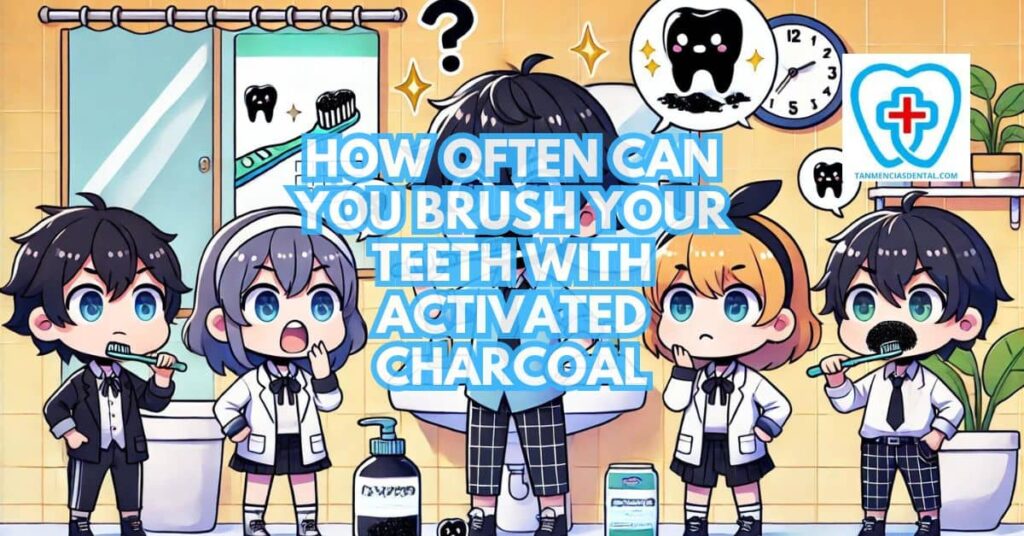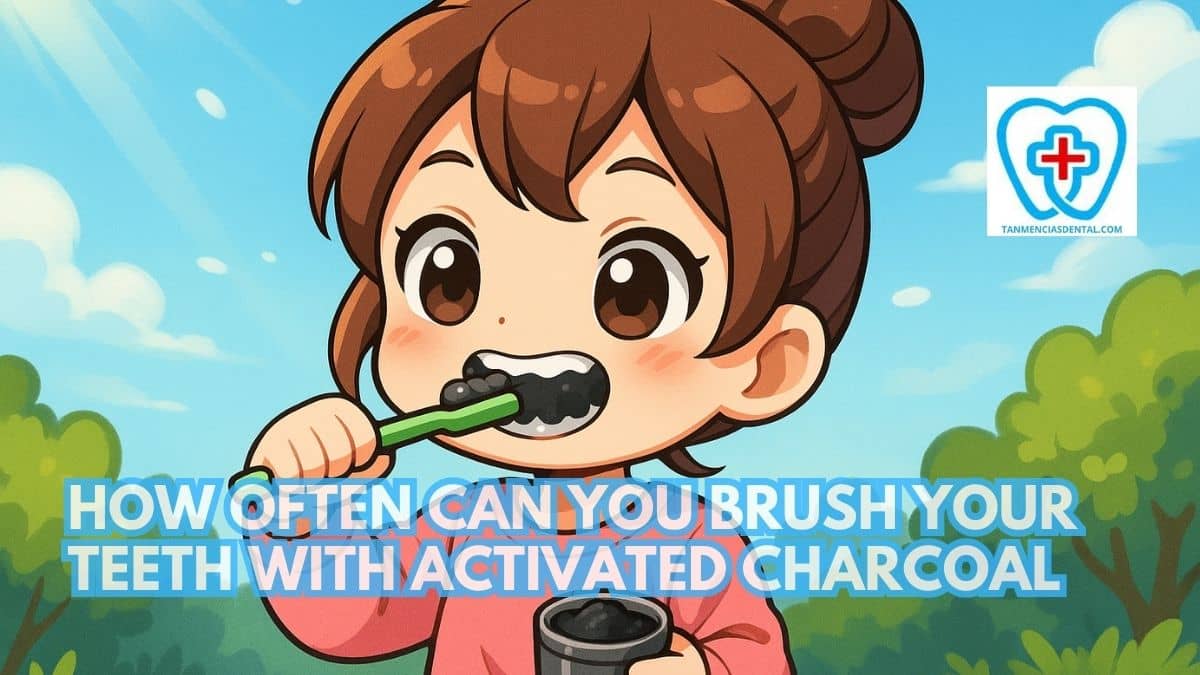Activated charcoal is often used to whiten teeth, but many people don’t know if it’s really safe.
Some say it helps remove stains, while others worry it might damage tooth enamel.
We’ll explain how often you can brush your teeth with activated charcoal and what risks to watch out for.
It also covers what dentists recommend and how charcoal fits into a healthy oral care routine.
Knowing the facts can help you make smart choices for your teeth.
1. The Potential Benefits of Brushing with Charcoal: Stain Removal and More
Activated charcoal, which is often used in products like charcoal toothpaste or powders, can help remove surface stains from your teeth.
Its tiny pores can trap plaque, food particles, and substances that cause discoloration.
This may make your teeth look a little whiter after brushing.
Some people say they notice a brighter smile after a few uses, but results can vary depending on your habits and how stained your teeth are.
Unlike regular toothpaste, most charcoal products do not have fluoride, so they should not replace your daily toothpaste.
Activated charcoal does not change the natural color of your teeth and only works on stains near the surface.
To avoid harming your enamel, it’s best to use activated charcoal just once or twice a week.
🦷 How Do Dentists Treat Cavities?
2. Beware the Grit! Abrasiveness of Charcoal and How to Brush Safely
Charcoal is abrasive and can wear down enamel if used too often.
To brush safely, use a soft-bristled toothbrush and apply gentle pressure.
Brushing with charcoal should be done with care to prevent damaging the enamel, which protects the inner layers of your teeth.
Limiting charcoal use to 1-2 times a week can help minimize the risk of abrasion.
It’s crucial to balance the use of charcoal with regular fluoride toothpaste to maintain enamel strength.
🦷 Why Whitening Trays Are Preferred Over Other Teeth Whitening Methods
3. Whitening Power? Limited Effects of Charcoal Compared to Other Options
Charcoal may help whiten your teeth by removing surface stains, but its whitening power is limited.
It does not reach the deeper layers of the tooth where tougher stains and discoloration often exist.
This is because charcoal does not affect the dentin, the layer beneath the enamel that can cause teeth to look yellow or dark.
In comparison, professional whitening treatments and some products with ingredients like baking soda can work more effectively to brighten both the enamel and slightly deeper layers.
Charcoal also does not change the natural color of your teeth; it only helps with stains on the surface.
If you want stronger or longer-lasting results, it’s best to talk to your dentist about other safe options.
While charcoal can be part of your routine, it should not replace proven methods for whitening your teeth.
🦷 Why Should Parents Choose a Specialized Dentist for Kids Over a General Dentist?
4. Don’t Ditch the Fluoride! Why Charcoal Isn’t a Replacement for Regular Brushing
Activated charcoal should not replace your regular fluoride toothpaste.
Fluoride is crucial for preventing cavities and strengthening enamel, which charcoal does not provide.
Using charcoal alone may leave your teeth vulnerable to decay and other dental issues.
It’s best to use charcoal as a supplementary treatment rather than a replacement.
Maintain your regular brushing routine with fluoride toothpaste to ensure comprehensive oral care.
🦷 How Dentistry For Kids Differs From Adult Dental Care

5. Potential Drawbacks: Increased Sensitivity and Messy Brushing
Using charcoal can increase tooth sensitivity, especially with frequent use.
The abrasive nature of charcoal can wear down enamel, leading to heightened sensitivity to hot and cold foods and drinks.
Additionally, brushing with charcoal can be messy, leaving black residue in your sink and on your toothbrush.
These drawbacks can make the experience less pleasant and more cumbersome.
Be aware of these potential issues before incorporating charcoal into your routine.
🦷 How to Choose the Best Clinic for Dental Consultation in Marikina
6. Brushing Frequency and Consulting a Dentist
Limit the use of activated charcoal to 1–2 times a week to avoid enamel damage.
Overuse can lead to significant wear and tear on your teeth, causing long-term issues.
It’s always wise to consult your dentist before starting any new oral care regimen, including the use of charcoal.
They can provide personalized advice based on your specific dental health needs.
Regular professional guidance ensures that your approach to using charcoal is safe and effective.
🦷 Why a Regular Dental Consultation is Crucial for Overall Health
7. Seeking Professional Advice: Why Consulting Your Dentist is Crucial
Your dentist can assess whether charcoal is suitable for you based on your enamel thickness and overall oral health.
They can recommend how often to use charcoal and suggest alternative whitening methods if necessary.
To keep track of any changes in your dental health due to the use of charcoal, schedule regular dental examinations.
Consulting a dentist helps you avoid potential risks and ensures that your oral care routine is effective.
Professional advice is key to maintaining a healthy, bright smile.
🦷 Why Choose a Denture Clinic Over a General Dental Clinic?
8. Safety First: Potential Risks and Lack of Long-Term Studies on Charcoal
There is limited research on the long-term effects of activated charcoal on teeth.
Potential risks include enamel erosion, increased sensitivity, and possible damage to dental restorations like fillings and crowns.
The lack of comprehensive studies means we don’t fully understand the long-term impact of charcoal use on dental health.
Until more information is available, it’s wise to use charcoal with caution and moderation.
Always consider the potential risks along with the benefits.
🦷 How Periodontal Cleaning Differs from Regular Dental Cleaning
9. Charcoal and Dental Work: Can It Cause Stains on Fillings and Crowns?
Activated charcoal may stain dental restorations, including fillings, crowns, veneers, and bridges.
Unlike natural teeth, these materials can absorb the charcoal particles, causing them to look darker or uneven in color.
This discoloration might be hard or even impossible for a dentist to remove without replacing the restoration completely.
If you have dental work, you should talk to your dentist before brushing with activated charcoal.
Using charcoal less frequently can also lower the risk of unwanted stains on your dental restorations.
🦷 Is Dental Deep Cleaning Necessary?
10. Charcoal with Caution: Prioritize a Healthy Routine for a Bright Smile
Maintain a balanced oral care routine that includes fluoride toothpaste, flossing, and regular dental visits.
Use activated charcoal sparingly to avoid potential damage to your teeth.
Combining charcoal with a consistent oral hygiene routine helps ensure that your teeth stay healthy while enjoying the benefits of occasional whitening.
Prioritizing overall dental health is key to achieving and maintaining a bright smile.
Charcoal can be part of your routine, but it shouldn’t dominate it.
🦷 Can Electric Toothbrushes Damage Gums?
11. Looking for Alternatives? Exploring Safe and Effective Whitening Options
Consider safe and effective alternatives to charcoal for teeth whitening.
Options include whitening toothpaste, strips, gels, and professional treatments from your dentist.
These methods often provide more consistent and reliable results without the risks associated with charcoal.
Consulting with your dentist about the best whitening options can help you achieve your desired results safely.
Exploring these alternatives ensures that you choose the best method for your oral health needs.
🦷 Experienced Dental Specialists in Marikina
👨⚕️ Conclusion
Making informed decisions about using activated charcoal can help you avoid potential risks.
Limit its use to avoid enamel damage, consult your dentist regularly, and prioritize a comprehensive oral care routine.
By balancing charcoal use with other dental hygiene practices, you can maintain a healthy, bright smile.
Understanding the pros and cons of charcoal will help you incorporate it safely into your routine.
A well-rounded approach is essential for long-term dental health.
😊 Self-Promotion
Visit Tan-Mencias Dental Clinic in Parang, Marikina City, for all your dental care needs!
Our friendly and experienced team is ready to help you achieve a healthy, bright smile.
You can reach us by calling 9171451074, sending a message through our Facebook page, or using the contact form on our website.
We’re here to answer any questions or concerns you may have.
Let us take care of your smile with personalized and professional dental services!

